"Cherishing Little Steps - A Haven for Baby and Family Journeys"
Preparing for Preschool Socialization
So, you’ve decided it’s time to prepare your little one for the wild world of preschool socialization. Congratulations! Because, you know, navigating the intricate web of social interactions at such a tender age is a piece of cake.
But fear not, dear reader, for I am here to guide you through this treacherous journey. In this discussion, we will explore various strategies to help your child thrive in the preschool social scene.
From establishing a positive attitude towards school to managing separation anxiety, we’ll cover it all. So, buckle up and get ready to embark on this adventure of preparing your child for preschool socialization.
Key Takeaways
- Preschool socialization helps develop strong communication skills and important social skills like sharing and cooperation.
- It also helps children develop empathy and understanding towards others, building a foundation for future relationships.
- Establishing a positive attitude towards school through positive reinforcement and a growth mindset is crucial for a smooth transition into preschool.
- Building social skills at home through playdates, family activities, and modeling positive behavior lays a strong foundation for future social development.
Understanding the Importance of Preschool Socialization
Understanding the importance of preschool socialization is crucial for you, as a parent or caregiver, to ensure that your child develops essential social skills that will lay the foundation for their future relationships and success in life. Early socialization offers numerous benefits and prepares children for future relationships.
One of the key benefits of early socialization is that it helps children develop strong communication skills. Through interactions with their peers, children learn how to express themselves, listen to others, and engage in meaningful conversations. They also learn how to interpret non-verbal cues, such as facial expressions and body language, which are essential for effective communication.
Additionally, socialization in preschool teaches children important social skills like sharing, taking turns, and cooperating with others. These skills are fundamental for building positive relationships and working collaboratively with others in the future. By learning to navigate social situations and resolve conflicts at an early age, children develop a strong foundation for building healthy relationships throughout their lives.
Furthermore, preschool socialization allows children to develop empathy and understanding towards others. Through interactions with diverse peers, children learn to appreciate different perspectives, cultures, and backgrounds. This helps them become more compassionate and open-minded individuals, capable of forming meaningful connections with people from all walks of life.
Establishing a Positive Attitude Towards School
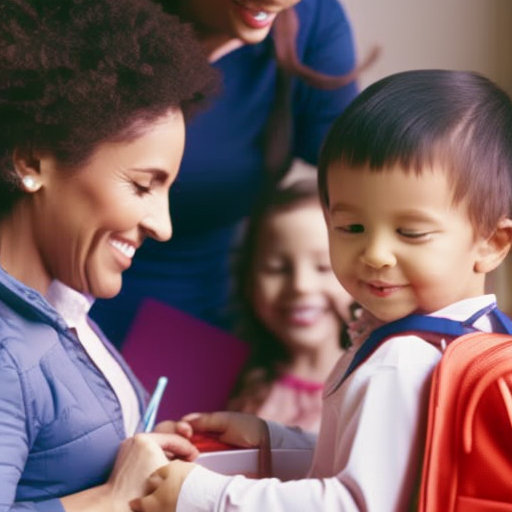
Now that you understand the importance of preschool socialization, it’s time to focus on establishing a positive attitude towards school. This is an essential step in helping your child transition smoothly into their first educational experience.
To foster a positive attitude, it’s crucial to use positive reinforcement and encourage a growth mindset.
Positive reinforcement involves acknowledging and rewarding your child’s efforts and achievements. It can be something as simple as praising their hard work or giving them a small treat for completing a task. By highlighting their successes, you’re encouraging a positive association with school and creating a sense of accomplishment.
Additionally, fostering a growth mindset is crucial in establishing a positive attitude towards school. Teach your child that intelligence and abilities can be developed through dedication and hard work. Encourage them to embrace challenges, learn from mistakes, and persist even when things get tough. By instilling a growth mindset, your child will approach school with enthusiasm and a belief in their own potential.
Building Social Skills at Home
To help your child develop essential social skills, create opportunities for interaction and cooperation within the home environment. Building confidence and promoting social interactions at home will lay a strong foundation for your child’s future social development.
Here are some simple yet effective ways to foster social skills in the comfort of your own home:
-
Encourage playdates: Invite other children over to your home for playdates. This allows your child to interact, share, and take turns with their peers, promoting important social skills such as communication and cooperation.
-
Engage in family activities: Participate in activities that involve the whole family, such as board games or cooking together. These activities provide opportunities for your child to learn how to work as a team, listen to others’ ideas, and express their own thoughts.
-
Model positive social behavior: Children learn by observing their parents and caregivers. Be a positive role model by demonstrating good manners, active listening, and respectful communication. This will help your child learn how to interact with others in a kind and considerate manner.
-
Encourage problem-solving: When conflicts arise between siblings or friends, encourage your child to find solutions on their own. This helps them develop problem-solving skills and learn how to resolve conflicts in a peaceful and respectful way.
Introducing Age-Appropriate Playdates
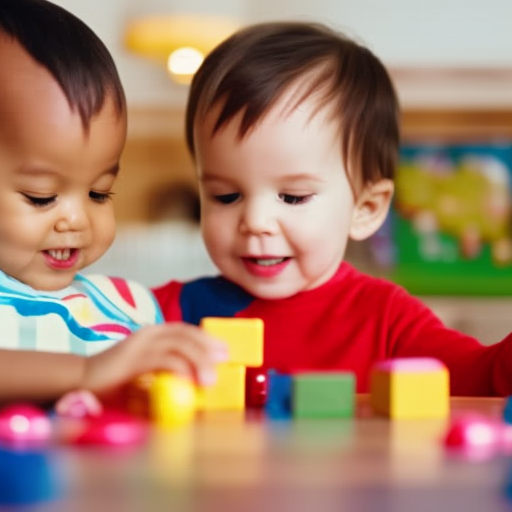
Introducing age-appropriate playdates can be a valuable way to enhance your child’s social development and foster meaningful interactions with their peers. Structured play and play-based learning are essential components of a child’s growth, and playdates provide the perfect opportunity to engage in these experiences.
During playdates, children can learn important skills such as sharing, taking turns, and problem-solving. They can also develop empathy and learn how to navigate social situations. By interacting with other children in a safe and supervised environment, your child will have the chance to practice these skills in a real-life setting.
To ensure that the playdates are age-appropriate, it is essential to consider your child’s developmental stage and interests. Here is a table to help you plan playdates that align with your child’s needs:
| Age Group | Recommended Activities |
|---|---|
| 2-3 years | Sensory play, simple pretend play |
| 4-5 years | Cooperative games, role-playing |
| 6 years and up | Team sports, board games |
Remember that playdates should be fun and enjoyable for your child. It is important to choose playmates who share similar interests and have compatible temperaments. By creating a positive and supportive play environment, you can ensure that your child’s social development is nurtured and their playdates become a source of joy and growth.
Encouraging Independent Problem-Solving
As your child engages in age-appropriate playdates and develops important social skills, it’s crucial to foster their independent problem-solving abilities. Encouraging your child to think critically and make decisions on their own won’t only boost their confidence but also prepare them for the challenges they may face in preschool and beyond.
Here are some strategies to help promote independent problem-solving:
-
Offer choices: Give your child the opportunity to make decisions by offering them choices. For example, you can ask, ‘Would you like to play with blocks or puzzles today?’ This allows them to practice decision-making skills while still having your guidance.
-
Provide open-ended questions: Instead of giving your child the answer right away, ask open-ended questions that encourage them to think and find solutions on their own. For instance, if they’re struggling with a puzzle, you can ask, ‘What do you think you could try next?’
-
Teach problem-solving steps: Teach your child a step-by-step approach to problem-solving, such as identifying the problem, brainstorming possible solutions, evaluating options, and choosing the best one. This framework will help them organize their thoughts and tackle challenges more effectively.
-
Celebrate effort and progress: Acknowledge your child’s efforts in independent problem-solving, even if the outcome isn’t perfect. Praise their attempts and highlight their progress, as this will motivate them to continue developing their skills.
Teaching Basic Communication Skills
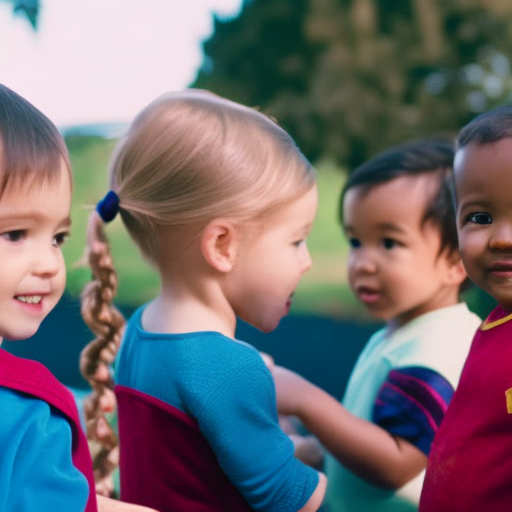
Building effective communication skills is essential in preparing your child for preschool and beyond. Teaching listening skills and developing conversational skills will help your child navigate social situations and express themselves effectively.
To teach listening skills, engage your child in activities that require active listening. Play games where they’ve to listen carefully and follow instructions, such as Simon Says or a scavenger hunt. Encourage them to listen to others when they’re speaking, without interrupting. Model good listening behavior by giving your full attention when they’re talking to you.
To develop conversational skills, provide opportunities for your child to engage in conversations with others. Encourage them to ask questions, take turns speaking, and respond appropriately. Practice having conversations with them, asking open-ended questions and showing genuine interest in their responses. Teach them how to introduce themselves and greet others politely.
It’s important to remember that developing communication skills takes time and practice. Be patient and provide plenty of opportunities for your child to interact with others. Celebrate their progress and offer positive reinforcement when they make an effort to communicate effectively.
Practicing Sharing and Taking Turns
Now that your child has developed basic communication skills, it’s time to focus on the important skill of practicing sharing and taking turns. These skills are crucial for your child’s social and emotional development as they prepare for preschool. By teaching them how to share and take turns, you’re helping them build the foundation for healthy relationships and cooperation with others.
Here are some activities you can incorporate into your daily routine to encourage sharing and turn-taking:
-
Sharing games: Engage your child in games that require sharing, such as sharing a set of blocks or taking turns with a toy. This will teach them the importance of sharing and waiting for their turn.
-
Turn-taking activities: Encourage your child to take turns during activities like storytelling, singing songs, or playing simple board games. This will help them understand the concept of waiting for their turn and respecting others’ time.
-
Model sharing and turn-taking: Be a role model for your child by demonstrating sharing and taking turns in your own interactions. This will show them the importance of these skills and how they can be practiced in everyday situations.
-
Praise and reinforce positive behavior: When your child successfully shares or takes turns, make sure to acknowledge and praise their efforts. This positive reinforcement will motivate them to continue practicing these skills.
Promoting Empathy and Kindness
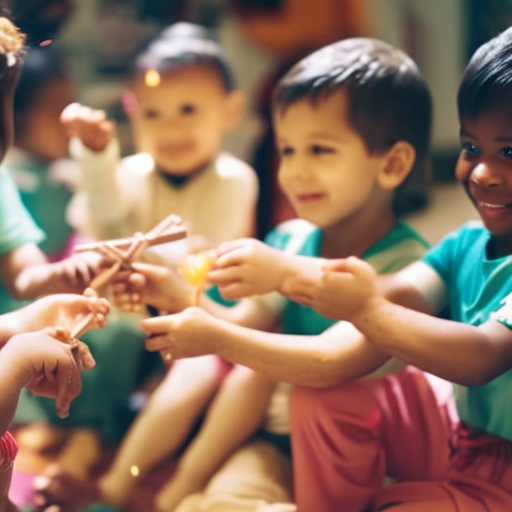
Encourage your child to show empathy and kindness towards others by incorporating simple daily activities into their routine. Developing empathy is an important skill that will help your child build strong relationships and navigate social situations with ease.
One way to promote empathy is by encouraging your child to think about how others may be feeling. For example, when reading a story together, ask your child how they think the characters might be feeling in different situations. This helps them understand that different people can have different emotions and perspectives.
Promoting kindness can be done through small acts of generosity. Encourage your child to share toys or help a friend clean up after playtime. Praising them for these actions reinforces the importance of being kind and caring towards others. You can also model kindness by demonstrating it yourself. Show your child how to be considerate by helping neighbors or volunteering in the community.
Another way to promote empathy and kindness is by teaching your child to listen actively. Encourage them to pay attention to what others are saying and respond with genuine interest. This shows respect and empathy towards others’ thoughts and feelings.
Managing Separation Anxiety
Transitioning into preschool can be a challenging time for both parents and children, and managing separation anxiety is an important aspect of this process. Separation anxiety is a normal part of a child’s development and can manifest when they’re separated from their primary caregivers. However, with the right coping strategies, you can help your child navigate this transition more smoothly.
Here are some effective ways to manage separation anxiety:
-
Establish a routine: Creating a predictable routine can provide a sense of security for your child. Knowing what to expect can help them feel more at ease when you’re not around.
-
Practice short separations: Gradually increasing the amount of time you spend away from your child can help them build confidence and trust. Start with brief separations and gradually extend the duration as they become more comfortable.
-
Use transitional objects: Encourage your child to bring a special toy or blanket from home. Having a familiar object can provide comfort and reassurance during the separation.
-
Communicate openly: Talk to your child about what to expect at preschool and address any concerns or worries they may have. Letting them express their feelings can help alleviate anxiety.
Creating a Consistent Routine

Establishing a consistent routine is crucial for helping your child adjust to preschool and feel more secure in their new environment. Consistency in routine provides children with a sense of stability, predictability, and control, which are essential for their overall development and well-being. By creating a stable environment, you’re giving your child the tools they need to navigate the challenges and changes that come with starting preschool.
Start by establishing a daily schedule that includes regular wake-up and bedtimes, meals, playtime, and quiet time. Consistency in these activities will help your child feel more at ease, as they’ll know what to expect throughout the day. Additionally, maintaining consistent routines when it comes to getting dressed, brushing teeth, and packing their backpack can instill a sense of responsibility and independence.
Incorporate rituals and traditions into your child’s routine to create a sense of comfort and connection. For example, you could have a special goodbye routine at drop-off, such as a hug and a secret handshake. These small rituals can provide reassurance and strengthen the bond between you and your child.
Remember to be flexible and adaptable within the routine. While consistency is important, it’s also important to allow for flexibility and spontaneity. This will help your child learn to navigate unexpected changes and transitions.
Fostering a Love for Learning

Nurturing a passion for learning starts with creating an environment that sparks curiosity and encourages exploration. As you prepare your child for preschool, it’s important to foster their natural curiosity and promote active engagement in the learning process.
Here are a few strategies to help you foster a love for learning in your child:
-
Provide a variety of materials and resources: Make sure your child has access to books, puzzles, art supplies, and other materials that stimulate their imagination and encourage hands-on exploration.
-
Follow their interests: Pay attention to your child’s interests and incorporate them into their learning experiences. If they love animals, for example, take them to the zoo or read books about different animals.
-
Encourage questions and curiosity: Create an environment where your child feels comfortable asking questions and seeking answers. Encourage their curiosity by engaging in conversations, providing explanations, and exploring together.
-
Make learning fun: Incorporate playful activities into their learning routine. Use educational games, songs, and interactive activities to make learning enjoyable and exciting.
Seeking Support From Preschool Professionals
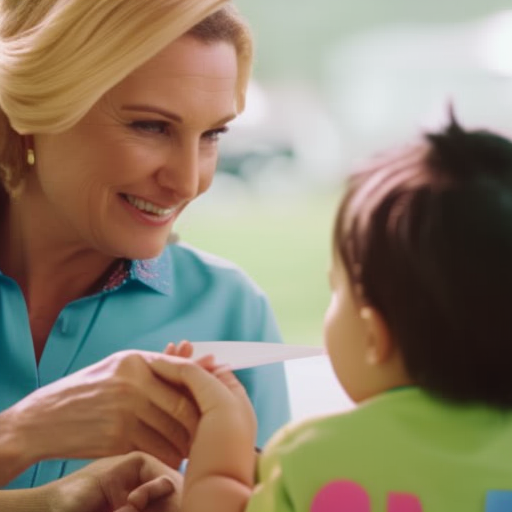
As you continue to prepare your child for preschool, it can be helpful to seek support from experienced preschool professionals who can offer guidance and expertise in supporting your child’s socialization journey. Preschool professionals undergo specialized training to understand the developmental needs of young children and how to create a nurturing and stimulating environment for them to grow.
These professionals have a deep understanding of the importance of socialization in a child’s early years. They know that social skills are crucial for building relationships, resolving conflicts, and navigating the world around them. Through years of experience, they’ve developed strategies and techniques to help children develop these essential skills.
Preschool professionals are well-versed in incorporating socialization into the curriculum. They understand that learning isn’t just about academic knowledge but also about emotional and social growth. They create opportunities for children to interact with their peers, engage in group activities, and practice important social skills such as sharing, taking turns, and communicating effectively.
Frequently Asked Questions
How Can I Handle My Child’s Separation Anxiety When Starting Preschool?
You can handle your child’s separation anxiety by gradually exposing them to short periods of separation, reassuring them that you will return, and building their resilience through positive experiences. It’s all about helping them feel safe and secure.
What Are Some Age-Appropriate Activities I Can Do at Home to Help Build My Child’s Social Skills?
To build your child’s social skills at home, engage in enjoyable activities that nurture emotional intelligence. Encourage sharing, turn-taking, and empathy through playdates, storytime, and imaginative play. These experiences create a foundation for successful preschool socialization.
How Can I Encourage My Child to Problem-Solve Independently?
To encourage independence and foster problem-solving skills, you can provide opportunities for your child to make decisions and solve simple problems on their own. Offer support and praise their efforts to build confidence.
What Are Some Strategies for Teaching My Child Basic Communication Skills?
To teach your child basic communication skills, try using interactive teaching techniques. Encourage them to express themselves through play and conversation, and provide opportunities for language development. These strategies will help prepare them for preschool socialization.
How Can I Promote Empathy and Kindness in My Child’s Interactions With Others?
You can promote empathy and kindness in your child’s interactions with others by teaching them through play. Encourage them to understand and share others’ feelings, and model kind behavior yourself.
Conclusion
So, as you prepare your child for preschool socialization, remember that it’s about more than just academics. It’s about building friendships, developing social skills, and fostering a love for learning.
By establishing a positive attitude towards school, providing opportunities for age-appropriate playdates, and encouraging independent problem-solving, you can help your child thrive in their preschool experience.
For example, a parent named Sarah noticed her son struggling with sharing toys during playdates, but through consistent practice and support, he learned valuable social skills and now enjoys playing with others.
Remember, with a little preparation and support, your child will be well-equipped to navigate the world of preschool and beyond.


